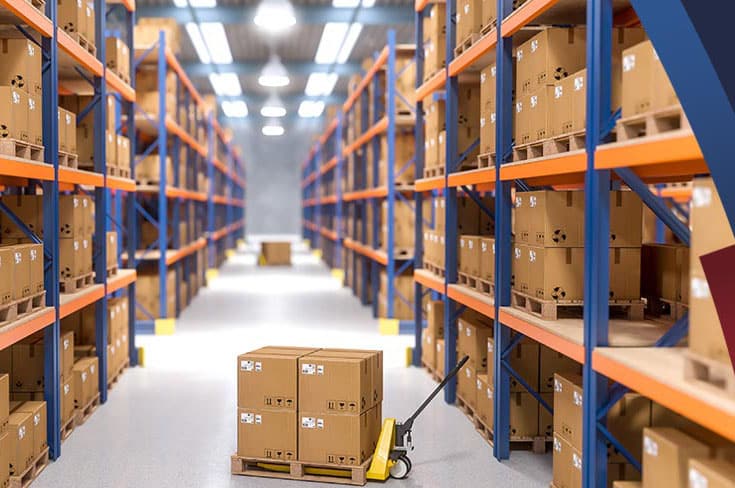In today’s time, when most conventional industries are becoming modern and taking on new dimensions, warehousing and Logistics Warehousing are not being left behind. The concept of a digital warehouse has marked a strategic leap into future dimensions, integrating advanced technologies for betterment in storage, operations, and efficiency. Here, we will describe some of the prime features of smart warehousing and how they are changing logistics face value.

Inventory Management in Real Time
One of the major characteristics of a digital warehouse is its inventory management system in real-time. Converse, traditional warehouses rely on manual tracking ways, while Digital Warehouses apply advanced software and IoT devices that provide minute-by-minute information on the levels of inventory. Sensors and RFID tags keep updating the inventory data continuously, thus enabling correct stock movement tracking. This real-time exposure avoids stockouts, eliminates overstocking, and enhances the accuracy of order fulfillment.
Automated Storage and Retrieval Systems
Automated Storage and Retrieval Systems are the ones that form the core of functionality for digital warehouses. ASRS will automate storage and the retrieval of goods by using robotic technology combined with conveyor systems. ASRS has the potential to enhance efficiency by reducing time and labor associated with manual handling. Advanced algorithms running on robots can navigate high-density storage, find items in no time, and transport them to their required locations. This automation not only accelerates internal working within a warehouse but also minimizes human error.
Advanced-Data Analytics
Thus, digital warehouses are embracing cutting-edge analytics in decision-making to enhance their operational efficiency. This way, a digital warehouse would derive actionable insights from huge volumes of information gathered from different sources, including inventory levels, history of orders placed, and shipping patterns. For instance, predictive analytics can anticipate demand trends, ensure the optimization of the level of inventory, and calculate in advance the probability of supply chain disruption. This allows a warehouse to operate much more proactively and strategically.
Cloud-Based Systems
Cloud plays a very important role in the whole logistics warehousing ecosystem. The WMS system on the cloud helps provide scalable and flexible solutions to run warehouses in an easy, seamless manner. Unlike traditional on-premises applications, cloud-based WMSs are accessible from anywhere with internet connectivity, thus enabling remote management and collaboration. Apart from this, the cloud solutions offer total integration with other business systems such as enterprise resource planning and customer relationship management, thus providing an integrated platform for managing logistics operations.
Introduction of Enhanced Security Measures
With the advancement in digital technologies, security has become the utmost top-grade concern for every digital warehouse in recent times. For that, modern digital warehouses are constituted with robust security measures that ensure the protection of sensitive data and guarantee integrity in operations. Advanced security systems included biometric access to premises, video surveillance, and encrypted data transmission. Besides, cybersecurity measures ensured that these were protected from cyber-attacks and unauthorized access. This way, all assets physical and digital- are kept safe, with minimal risks related to breaches or theft.
Artificial Intelligence and Machine Learning in Operation
AI and machine learning are revolutionizing how Smart Warehousing operates. For instance, AI algorithms can analyze complex sets of data to come up with better warehouse processes that involve route planning even in picking and packing. In the same vein, Machine Learning models are applied to predict equipment maintenance to reduce downtime while increasing machinery life span in the warehouse. Virtual assistants and AI-powered chatbots provide customer support and therefore manage routine inquiries, freeing human resources for tasks at higher value.
Sustainable Practices
This has become one of the critical talking points within the logistics industry, and at the very forefront of embracing all manner of environmentally friendly initiatives are digital warehouses. There is the fitting of energy-efficient lighting, climate control systems, or the use of green materials in building the facility. Simultaneously, optimization algorithms reduce waste and further facilitate efficiency in resource use. In implementing sustainability as a cornerstone for their operations, digital warehouses align in concert with environmental objectives and stand to further reduce operational costs.
Flexibility and Scalability
Digital warehouses offer unequaled flexibility and scalability compared to their traditional versions. Logistics warehousing, due to the nature of cloud-based systems and modular technologies, can easily adapt to evolving business needs and can quickly scale up or down according to operational requirements. This flexibility is indeed very valuable for companies with rapidly growing or fluctuating demand, thus helping them maintain warehouse resources without heavy capital investment.
A Quick Wrap-Up!
Smart warehousing has put into practice efficiency, accuracy, and flexibility. In fact, with continuous technological development, the capabilities of digital warehouses will keep expanding and create continuous innovation in logistics. Embracing these new developments with Moov Logistics. They are known for their expert services and skilled trainers. So, contact them right away, and surely you will benefit.

 简体中文
简体中文 Nederlands
Nederlands